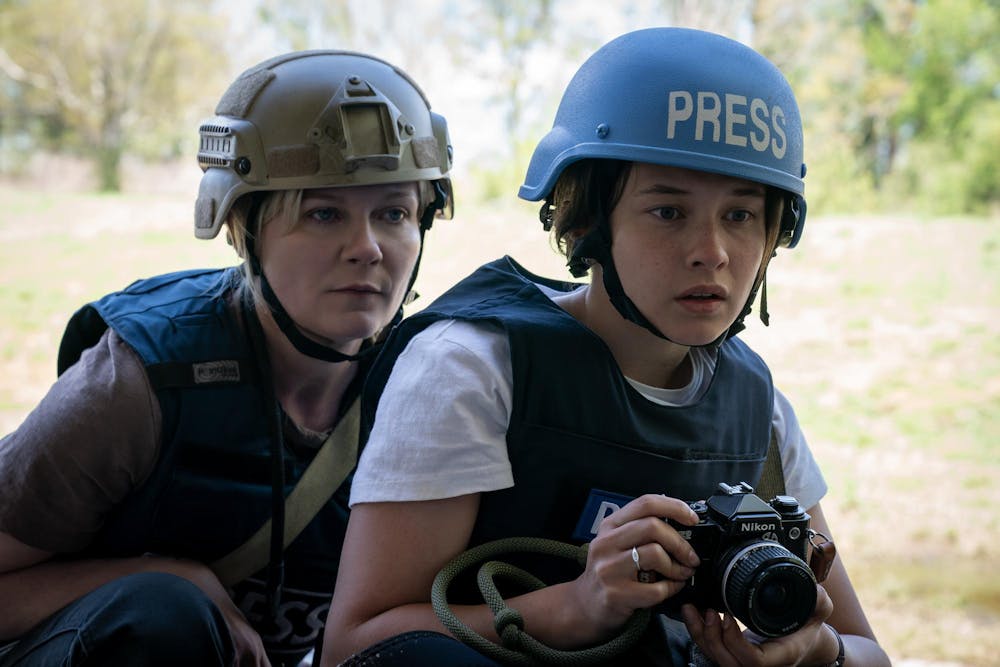Does the “anti-war” film really exist? According to François Truffaut, one of the pioneers of the French New Wave, the answer is no. Onscreen violence is invariably exciting to the viewer when it is presented as narrative conflict. Steven Spielberg, director of “Saving Private Ryan,” believes otherwise: “Of course, every war movie, good or bad, is an anti-war movie.” So maybe the film’s depiction of war violence is inherently oppositional; it’ll unsettle the viewer no matter the intention behind it.
This is a debate “Civil War” director Alex Garland seems entirely uninterested in contributing to. Despite the blunt title and dystopian, near-future setting, Garland’s vision of a divided America focuses largely on the individual — in this case, a group of photojournalists with an ethical obligation to capture the decline of American civilization through their lens.
Structured like an apocalyptic road movie, the film tracks Lee (Kirsten Dunst), a seasoned industry veteran, Joel (Wagner Moura), Lee’s partner and Jessie (Cailee Spaeny), a young photographer whom Lee begrudgingly takes under her wing, as they travel to Washington D.C. to interview the president before he’s killed by the rebel Texas-California alliance (referred to in the film as the Western Forces). Along the way, they stop to photograph various small-scale conflicts including a sniper stand-off at a remote farmhouse and a militia’s charge against a group of loyalists.
For the most part, the fighters react to the journalists’ presence with indifference. But, in the most unnerving scene — an important distinction for a film that rarely lets the viewer catch their breath — an assault rifle-toting insurgent (Jesse Plemons) questions them, asking “What kind of American, are you?” Sporting cheap red sunglasses and chilling apathy, Plemons’ executioner isn’t a big bad military man; he’s a seemingly normal guy who’s using the war to realize his own idea of a new America.
Garland’s emphasis on the individual is exemplified by his stubbornness to not reveal the origins or reasoning behind the war. The political framing of the conflict is neutral and, from the journalists’ perspective, unimportant in the grand scheme of things. Understanding the civilian’s response means understanding the war more intimately.
The nature of the conflict is ambiguous, but the violence is not. Although Jessie is noticeably shaken at first, the journalists react to the brutal bloodshed with unflinching professionalism. These moments are horrifying because they’re presented so casually. In Garland’s America, the natural world’s sounds have been replaced by the echo of distant gunfire. When Lee, Joel and Jessie reach the White House, the cacophony of chaos becomes overwhelming. Gunfire hasn’t been this soul-piercing since Michael Mann’s “Heat” in 1995.
With decaying buildings, overgrown greenery and lifeless bodies littered in the street, “Civil War” looks more like an early episode of “The Walking Dead” than a big budget war movie, but an eerie layer of familiarity remains. The nice New York City hotel that acts as a hub for journalists like Lee and Joel is fully functional despite riots outside. Rebels wear Hawaiian shirts as they sneak up on a wounded soldier. A sniper sports a neon green buzz cut and painted nails. The inhabitants of a small town in the middle of nowhere ignore the war and go about their lives like nothing’s wrong. These traces of normality aren’t as provocative as they are helpful in pinpointing the ethos of Garland’s America.
“Civil War” is ultimately a film about coping with ethical, moral and personal responsibility. Lee and Jessie go to dangerous lengths to get the money shot, but we never actually see how their photos impact the public. Lee understands the weight of this burden, but Jessie becomes intoxicated by the chase. If violence is inherently exciting, then the camera is the ultimate weapon — a loaded gun with the ability to immortalize even the ugliest truths.






